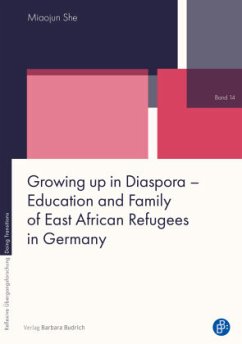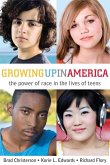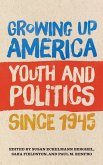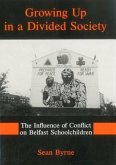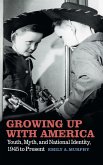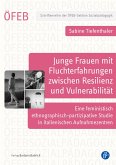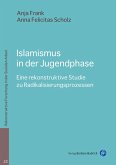Miaojun She
Growing up in Diaspora - Education and Family of East African Refugees in Germany
Miaojun She
Growing up in Diaspora - Education and Family of East African Refugees in Germany
- Broschiertes Buch
- Merkliste
- Auf die Merkliste
- Bewerten Bewerten
- Teilen
- Produkt teilen
- Produkterinnerung
- Produkterinnerung
Im Mittelpunkt dieses Buches stehen die Lebenserfahrungen junger ostafrikanischer Flüchtlinge in Deutschland. An der Schnittstelle von Migrations- und Transitionsforschung angesiedelt, zeichnet die Autorin ein umfassendes Bild davon, wie junge Flüchtlinge mit den Herausforderungen der Partizipation in den Bereichen Bildung und Beruf umgehen. Wie gelingt es ihnen, eine transnationale Familiengemeinschaft inmitten der institutionalisierten Diskriminierung in der Aufnahmegesellschaft aufrechtzuerhalten? Die Arbeit porträtiert verschiedene Wege der Bewältigung von Übergangszwängen und zeigt, wie…mehr
Andere Kunden interessierten sich auch für
![Der Übergang aus der stationären Jugendhilfe Der Übergang aus der stationären Jugendhilfe]() Christine SchatzDer Übergang aus der stationären Jugendhilfe38,00 €
Christine SchatzDer Übergang aus der stationären Jugendhilfe38,00 €![Growing Up in America Growing Up in America]() Richard FloryGrowing Up in America120,99 €
Richard FloryGrowing Up in America120,99 €![Growing Up America Growing Up America]() Growing Up America110,99 €
Growing Up America110,99 €![Growing Up in a Divided Society Growing Up in a Divided Society]() Sean ByrneGrowing Up in a Divided Society118,99 €
Sean ByrneGrowing Up in a Divided Society118,99 €![Growing Up with America Growing Up with America]() Emily A MurphyGrowing Up with America139,99 €
Emily A MurphyGrowing Up with America139,99 €![Junge Frauen mit Fluchterfahrungen zwischen Resilienz und Vulnerabilität Junge Frauen mit Fluchterfahrungen zwischen Resilienz und Vulnerabilität]() Sabine TiefenthalerJunge Frauen mit Fluchterfahrungen zwischen Resilienz und Vulnerabilität36,00 €
Sabine TiefenthalerJunge Frauen mit Fluchterfahrungen zwischen Resilienz und Vulnerabilität36,00 €![Islamismus in der Jugendphase Islamismus in der Jugendphase]() Anja FrankIslamismus in der Jugendphase49,90 €
Anja FrankIslamismus in der Jugendphase49,90 €-
-
-
Im Mittelpunkt dieses Buches stehen die Lebenserfahrungen junger ostafrikanischer Flüchtlinge in Deutschland. An der Schnittstelle von Migrations- und Transitionsforschung angesiedelt, zeichnet die Autorin ein umfassendes Bild davon, wie junge Flüchtlinge mit den Herausforderungen der Partizipation in den Bereichen Bildung und Beruf umgehen. Wie gelingt es ihnen, eine transnationale Familiengemeinschaft inmitten der institutionalisierten Diskriminierung in der Aufnahmegesellschaft aufrechtzuerhalten? Die Arbeit porträtiert verschiedene Wege der Bewältigung von Übergangszwängen und zeigt, wie junge Flüchtlinge ihre biografischen Verläufe mit den ihnen zur Verfügung stehenden soziokulturellen und biografischen Ressourcen gestalten.
Produktdetails
- Produktdetails
- Reflexive Übergangsforschung - Doing Transitions 14
- Verlag: Verlag Barbara Budrich
- Artikelnr. des Verlages: 13272
- Seitenzahl: 290
- Erscheinungstermin: 12. Mai 2025
- Englisch
- Abmessung: 210mm x 148mm
- ISBN-13: 9783847430650
- Artikelnr.: 70604741
- Herstellerkennzeichnung Die Herstellerinformationen sind derzeit nicht verfügbar.
- Reflexive Übergangsforschung - Doing Transitions 14
- Verlag: Verlag Barbara Budrich
- Artikelnr. des Verlages: 13272
- Seitenzahl: 290
- Erscheinungstermin: 12. Mai 2025
- Englisch
- Abmessung: 210mm x 148mm
- ISBN-13: 9783847430650
- Artikelnr.: 70604741
- Herstellerkennzeichnung Die Herstellerinformationen sind derzeit nicht verfügbar.
Miaojun She, is a researcher at the Institute for Applied Family, Childhood and Youth Research, University of Potsdam, Germany.
1. Introduction 2. Boundary-making and an Inquiry about "Young Refugees" 2.1. Refugees in the global nation system 2.1.1. The nation-state system and its influence on East Africa 2.1.2. Border imperialism and categorization of people on the move 2.2. Youth in the modern meritocracy 2.2.1. Between youth and adulthood 2.2.2. Capitalism and marginalization of young adults 2.3. An inquiry about "young refugees" and their "double transitions" 2.4. A brief overview of the research field 3. A Post-structuralist and Post-colonial Biographical Transition Research-Theory and Method 3.1. Toward a theory of (un)doing biographical transitions 3.1.1. The framework of doing differences and doing transitions 3.1.2. Practice theory as the analytical lens 3.2. Biographical research in a post-structuralist and post-colonial tradition 3.2.1. The German tradition of biographical research and its connection with practice theory 3.2.2. Biographical research and post-structuralism 3.2.3. Biographical research and post-colonialism 3.3. Reflexivity as the principle of research practice 4. Research Design and Procedures 4.1. Research design and access to the field 4.1.1. The biographical narrative interview 4.1.2. Recruitment and sampling 4.2. Evaluation and analysis 4.2.1. Evaluation principles 4.2.2. Analyzing steps 4.3. Ethical Considerations 4.4. Limitation of the research design and method 5. Growing up in Diaspora: Case Illustrations 5.1. Kai: Growing up with escape and resilience 5.1.1. Research process and interview constellations 5.1.2. Biographical portrait: living with warfare and resistance 5.1.3. Theoretical summary: education and biographical resistance 5.2. Markus: Longing for equality and cohabitation 5.2.1. Research process and interview constellations 5.2.2. Biographical portrait: escaping persecution and discrimination 5.2.3. Theoretical summary: community and social orientation 5.3. Dilara: coping with marginalization and loneliness 5.2.1. Research process and interview constellations 5.3.2. Biographical portrait: growing up with trauma and hope 5.3.3. Theoretical summary: connection and doing agency 6. Growing up in Diaspora: Dimensions of transitions 6.1. Cases in Overview: Growing up in Diaspora 6.2. Education and the dialectic of vulnerability and resilience 6.2.1. Education in young refugees' transitions: challenges and opportunities 6.2.2. Educational aspiration and biographical resources 6.2.3. Biographical learning and the dialectic of vulnerability and resilience 6.3. Family and the dialectic of transmission and transformation 6.3.1. Family and the collective migratory path 6.3.2. The transnational familyhood 6.3.3. Strong ties versus weak ties 6.3.4. The dialectic between transmission and transformation 6.4. Temporality-linking the past, present and future in transitions 6.4.1. Temporality in the migration governance 6.4.2. Doing optimism through the imagination of future 6.4.3. Defining agency in the temporal dimension 7. Conclusion and Prospect: Exploring Transitions in Time and Space 7.1. From double transitions to relational transitions 7.2. Research limitations and prospect References Appendix
1. Introduction 2. Boundary-making and an Inquiry about "Young Refugees" 2.1. Refugees in the global nation system 2.1.1. The nation-state system and its influence on East Africa 2.1.2. Border imperialism and categorization of people on the move 2.2. Youth in the modern meritocracy 2.2.1. Between youth and adulthood 2.2.2. Capitalism and marginalization of young adults 2.3. An inquiry about "young refugees" and their "double transitions" 2.4. A brief overview of the research field 3. A Post-structuralist and Post-colonial Biographical Transition Research-Theory and Method 3.1. Toward a theory of (un)doing biographical transitions 3.1.1. The framework of doing differences and doing transitions 3.1.2. Practice theory as the analytical lens 3.2. Biographical research in a post-structuralist and post-colonial tradition 3.2.1. The German tradition of biographical research and its connection with practice theory 3.2.2. Biographical research and post-structuralism 3.2.3. Biographical research and post-colonialism 3.3. Reflexivity as the principle of research practice 4. Research Design and Procedures 4.1. Research design and access to the field 4.1.1. The biographical narrative interview 4.1.2. Recruitment and sampling 4.2. Evaluation and analysis 4.2.1. Evaluation principles 4.2.2. Analyzing steps 4.3. Ethical Considerations 4.4. Limitation of the research design and method 5. Growing up in Diaspora: Case Illustrations 5.1. Kai: Growing up with escape and resilience 5.1.1. Research process and interview constellations 5.1.2. Biographical portrait: living with warfare and resistance 5.1.3. Theoretical summary: education and biographical resistance 5.2. Markus: Longing for equality and cohabitation 5.2.1. Research process and interview constellations 5.2.2. Biographical portrait: escaping persecution and discrimination 5.2.3. Theoretical summary: community and social orientation 5.3. Dilara: coping with marginalization and loneliness 5.2.1. Research process and interview constellations 5.3.2. Biographical portrait: growing up with trauma and hope 5.3.3. Theoretical summary: connection and doing agency 6. Growing up in Diaspora: Dimensions of transitions 6.1. Cases in Overview: Growing up in Diaspora 6.2. Education and the dialectic of vulnerability and resilience 6.2.1. Education in young refugees' transitions: challenges and opportunities 6.2.2. Educational aspiration and biographical resources 6.2.3. Biographical learning and the dialectic of vulnerability and resilience 6.3. Family and the dialectic of transmission and transformation 6.3.1. Family and the collective migratory path 6.3.2. The transnational familyhood 6.3.3. Strong ties versus weak ties 6.3.4. The dialectic between transmission and transformation 6.4. Temporality-linking the past, present and future in transitions 6.4.1. Temporality in the migration governance 6.4.2. Doing optimism through the imagination of future 6.4.3. Defining agency in the temporal dimension 7. Conclusion and Prospect: Exploring Transitions in Time and Space 7.1. From double transitions to relational transitions 7.2. Research limitations and prospect References Appendix

